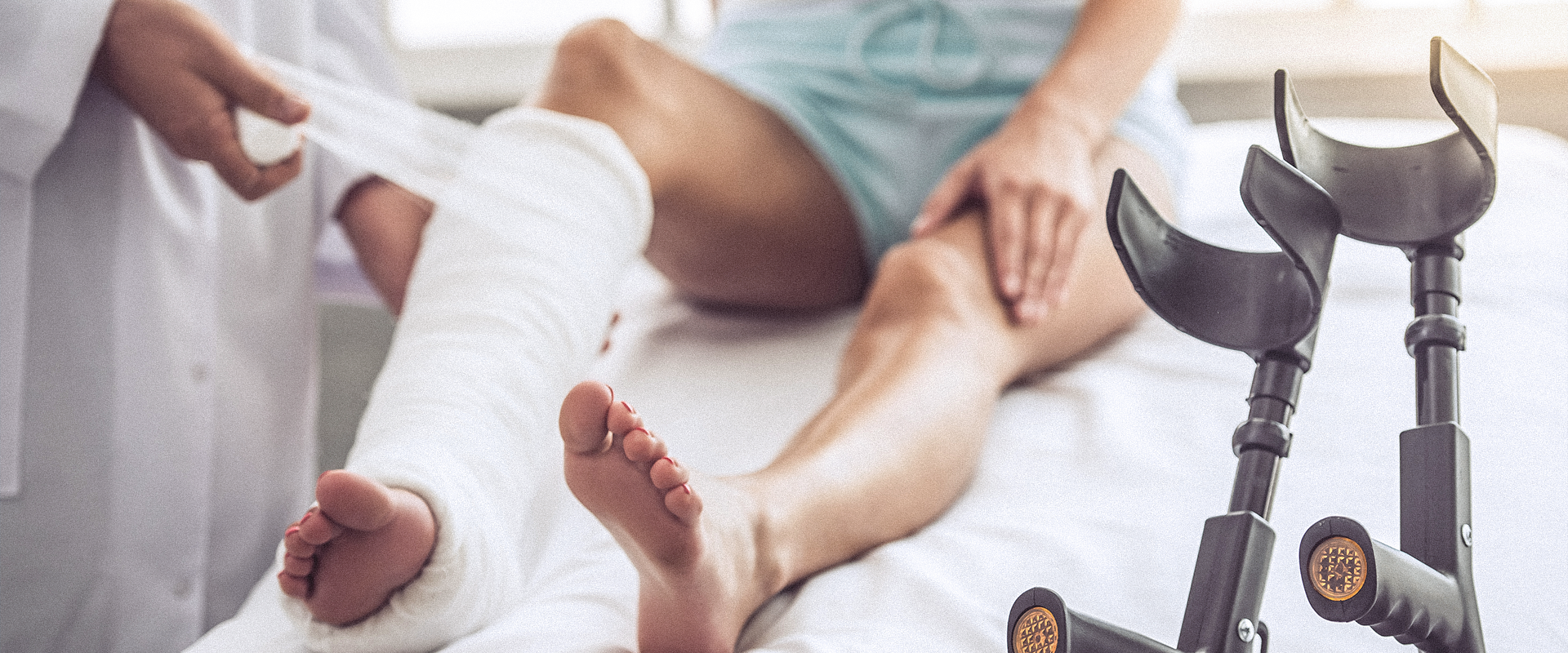
Physical Therapy for Stress Fractured Bones
AT EVOLVE
Physical Therapy for Stress Fractured Bones
HOW CAN PHYSICAL THERAPY FOR STRESS FRACTURES HELP ME?
Stress fractures, also known as bone stress injuries (BSI) can be a scary injury for an athlete or active person. Physical therapists play an important role in the detection, treatment and prevention of bone stress injuries from the very start. My team of physical therapists will evaluate your injury and refer you to an orthopedic or sports medicine physician if they suspect a bone stress injury. After a BSI has been diagnosed, physical therapists can help you to maintain as much strength and fitness throughout the recovery process as possible, then guide you through a gradual return to activity program and a re-injury risk reduction program.
HOW LONG WILL IT TAKE TO RECOVER?
The time it takes to recover from a bone stress injury depends on the site of the injury and its stage when detected. Lower stage stress fractures in low risk areas will have a faster recovery time than higher stage injuries in a high risk area. While this process may take several months to ensure complete bone healing, you can still be active in other ways. Our therapists can teach you how to keep the uninjured parts of your body strong and flexible and show you safe ways to maintain as much fitness as possible.
HOW IS A STRESS FRACTURE DIFFERENT FROM ANY OTHER BONE FRACTURE?
Most of us picture a broken wrist or a broken leg when we hear the word fracture. The term fracture refers to a crack or break in the structure of the bone. In the most traditional sense, a fracture occurs as a result of a single large force to the bone that is too great for the bone to withstand causing it to crack or break.
Stress fractures occur in response to repetitive submaximal loading without sufficient recovery time. This repetitive stress exceeds the bone’s elastic resistance causing structural fatigue and eventually what we know as a stress fracture. These injuries occur most often in weight bearing bones like the tibia (lower leg), femur (thigh bone), and foot. Due to the repetitive nature of their activities, military personnel and athletes are two populations most susceptible to developing a stress fracture. Risk factors for developing a stress fracture include things such as a history of a prior stress fracture, high training volumes with minimal rest days, low bone mineral density, inadequate vitamin D intake, poor sleep, disordered eating, menstrual cycle dysfunction and inadequate fueling.
WHAT ARE THE SIGNS OF A STRESS FRACTURE?
While stress fractures typically occur in the lower body, they can occur elsewhere in the body such as in the humerus (upper arm bone) and even the ribs. It is important to know how to identify the signs and symptoms of a potential stress fracture so that you can address it correctly.
Here are some signs to look out for:- Sudden insidious onset of relatively localized pain with activity
- Pain with activity that progresses to pain persisting at rest
- Pain in the leg that worsens when you hop on that leg
- Groin pain with activity or rest or when rotating the thigh inwardly.
- Pain in the thigh with the “fulcrum test”
- Pain with palpation over the injured area of bone
- Soft tissue swelling over the injured area of bone
WHAT SHOULD I DO IF I SUSPECT I HAVE A STRESS FRACTURE?
It is important that stress fractures are identified as quickly as possible because the treatment protocol for a bone stress injury is different from the treatment of a muscle strain or ligament sprain, for example. Here are some things to keep in mind when addressing a possible stress fracture:
-Don’t ignore it! A stress fracture identified early will heal much more quickly than one identified late. Individuals at highest risk for stress fractures are used to pushing through discomfort but signs of a stress fracture should not be ignored as it will worsen if you continue to put repeated stress on the already weakened bone. This can lead to progression from edema in the bone to a crack or full break and in worst cases require surgical fixation to stabilize the bone.
If you are experiencing new-onset pain with activity or if it has progressed to being painful at rest but you aren’t sure what the cause is, you can schedule an evaluation with one of the physical therapists on our team. If you present with risk factors for a bone stress injury and our therapists feel you may have one, they will refer you to the appropriate physician for evaluation. If they feel the likelihood of your symptoms being a stress fracture is low, they can initiate treatment right away and address the injury you do have.
If you are having difficulty walking or putting weight on the injured area, the bone looks deformed or it is difficult to move the area it is a good idea to see a doctor right away so they can order the appropriate imaging and initiate care.
X-rays will not show a stress fracture in the first few weeks after symptoms onset so if your symptoms are relatively new, a clean x-ray does not mean you could not have a stress fracture and continuing to push through discomfort may cause progression of the injury.
MRI is the imaging modality of choice as it can show bone stress injuries even in the early stages which will guide the appropriate treatment plan.
End Injury Progression
Physical therapy for stress fractured bones has proven to slow and even stop injury progression in many cases.
Relieve Pain
The movements used in this technique can target your lower back, upper back, hips, shoulders, and neck helping you to manage pain during the course of your physical therapy treatments.
Improve Range of Motion
Posture awareness is an important area to focus on due to the fact that certain positions may cause you even further pain.
Restore Mobility
You can gain mobility and flexibility by taking part in the stretches and exercises as prescribed by your physical therapist.
HOW CAN PHYSICAL THERAPY HELP?
Physical therapists play an important role in the prevention and recovery from a bone stress injury. Modification of weight bearing and pain management strategies followed by a gradual reintroduction to weight bearing and activity is the general treatment outline for stress fractures. If surgery was performed to stabilize the fracture your timeline to weight bearing and recovery will be different but our PTs can help in either case.
Here are some of the elements of a stress fracture treatment plan:
An exercise program for uninjured areas of the body to minimize loss of strength and fitness during recovery time
A screening for risk factors of a stress fracture to help prevent another stress fracture in the future
Training on how to use crutches, canes, walkers, etc. during modified weightbearing
Guidance and support on a return-to-activity program that promotes long-term recovery and restoration of prior performance levels
Evaluation of other impairments such as muscle performance or motor control deficits, impaired flexibility and so forth which could predispose you to other injuries in the future.
So, while learning that you have a stress fracture can feel overwhelming, with the right support from knowledgeable health and performance experts, you can come back from this injury ready to perform and with the knowledge to minimize your risk for future injury. If you are currently recovering from a stress fracture or think you may have one, our team of physical therapists is here to help. Call us today to learn more about our services and schedule an evaluation:
Mill Basin (located in Harbor Fitness)
6161 Strickland Ave
Brooklyn, NY 11234
Monday: 7am-8pm
Tuesday: 7am-8pm
Wednesday: 8am-5pm
Thursday: 7am-8pm
Friday: 8am-1pm
Park Slope (located in Harbor Fitness)
550 5th Ave.
Brooklyn, NY 11215
Monday: 9am-8pm
Tuesday: 8am-6pm
Wednesday: 9am-8pm
Thursday: 8am-6pm
Friday: 8am-3pm
Gravesend
372 Avenue U
Brooklyn, NY 11223
Monday-Thursday: 8am-8pm
Friday: 8am-3pm
Ready to take the next step to a healthier you?
Contact Us Today!
PHYSICAL THERAPY FOR FRACTURED BONES AT EVOLVE!
Need Physical Therapy for Your Healing Fractured Bones?
Let our caring and compassionate physical therapists help you with relieving pain while getting you back on your feet comfortably.
Call now to schedule your first PT consultation free of charge.
Call: 1-718-258-3300







